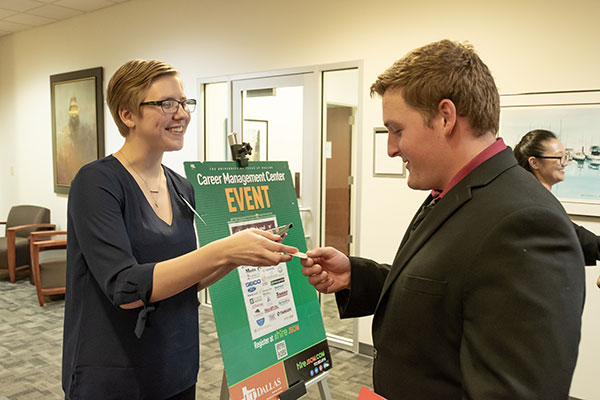
Step 8: Reporting Your Internship for Credit
Congratulations! It’s time to share your good news and earn internship course credit.
Guides for Students

Internship Guide for Students
Internships make you more marketable for full-time hiring by providing real world experience.
Go to Internship Guide
CPT FAQs for Students
As an F-1 student you may apply for CPT authorization to work in the USA off campus.
Go to CPT GuideInternship Guide and FAQs for Students
How to Report Your Internship in Orion
Finding an internship
The University will only consider internships that are located in a commercial setting and not in a private residence or home office.
You may secure your own internship through other employer/internship platforms, and the employer provides a detailed description of your responsibilities.
JSOM Policy
- If you are in the first six months of a job that is related to your degree program, you can use your work to fulfill the requirement
- You can do an in-company project – over and above your regular work – to satisfy the requirement. Submit a project description approved by your supervisor/management showing the number of hours of effort planned for the project into Orion. Note the project description is in lieu of the job offer in Orion when you request your internship. The project must be related to your degree program.
- Masters student may have degree program specific alternative courses that meet the internship requirement, including a practicum. Check your catalog and consult with your program director.
The employer will decide the hours. It may vary from week to week. It may include overtime at the employer’s discretion. There is no upper limit, but we advise students not to overextend themselves – leave enough time to excel both at the internship and in class commitments.
- Graduates
- GPA of 3.0 or higher
- Completed 1 semester (US/PR) or 2 long semesters (F1 student)
- Completed 12 credit hours at the Masters level
- Undergraduates
- GPA of 2.0 or higher
- Completed required number of credit hours for the program
- Refer to your academic catalog for Accounting
- Read the job description, and check that it clearly aligns with your degree program content and level. If in doubt, talk to your program manager.
- You must be a student in good academic standing and meet all of the internship program requirements. If you have questions about eligibility, talk to a Career Development Specialist in the Career Management Center.
- Your internship will be reviewed, any questions resolved, and when approved, you will be able to sign up for the internship course.
Internship Approval Process
- Report the internship experience in Orion, including uploading the offer letter and job description.
- The company is reviewed for legitimacy and office location are confirmed
- Following company verification, the information is forwarded to the program director for their approval
- Meets internship program eligibility
- Job description is aligned with the program
- Internships dates are in the future and within the semester range
- At their discretion, the program director may request a policy waiver in certain circumstances
- Student is responsible for course enrollment, and payment of fees – after internship has been approved by the program director
- CPT requests will be submitted to ISSO upon confirmation of course enrollment
Paid or Unpaid Internships
Students are receiving education at UT Dallas, and should not be asked to pay for additional training by an employer. Third party employers sometimes offer the incentive of a “possible” client assignment after the training, and students should beware as they may be asked to repay the training cost. Note: Internships will not be approved without a confirmed client assignment. In these circumstances, students are advised to seek alternative internship opportunities.
The purpose of an internship is educational. The program is designed to provide you with an opportunity to gain practical experience, which complements classroom instruction. It is rare that employers will offer partial or full payment of tuition and fees. Even when tuition assistance occurs, you will usually be required to pay your university fees personally and then be reimbursed by the employer. Be sure that you thoroughly understand the employer’s policies and procedures for tuition reimbursement in the rare instance it is available.
Wages depend on the particular profession, the level of the position, the individual employer, and the local economy. You are generally paid at the same level as temporary employees in similar positions, but wages vary from employer to employer. Wages usually range from $8-$15 for undergraduate students and $12 – $25 for graduate students.
Internships can be paid or unpaid. We expect employers to comply with the Department of Labor guidelines regarding pay for internship experiences, and internships at “for-profit” companies are usually paid. Occasionally, an employer will offer an unpaid internship assignment. Although unpaid, this may offer valuable experience and networking opportunities important to your future career endeavors.
Internship Course Enrollment
Transcript notations are not an option, and they do not meet the degree program requirement. If you are an undergrad, consider the zero credit option, but you will still have to enroll in the class to meet the degree requirement.
- If you are a domestic student, you may report just one semester, but continue to work beyond the reported semester
- If you are an international student, you must enroll for an internship course in each semester.
Tuition and Other Costs
If you are eligible for a zero semester credit hour internship and registration is completed during regular registration, there will be no tuition or fees charged for the course.
CPT Specific
In the United States, Curricular Practical Training (CPT) provides temporary employment authorization for F-1 visa non-immigrant foreign students while enrolled in a college-level degree program. It allows international students to work off-campus during their academic program after one year of full-time study. Read UTD’s CPT page.
No. You must first enroll at UT Dallas for two long semesters (fall and spring) before you are eligible to apply for CPT.
No, CPT work authorization is for the USA only. If you receive an offer for another country, you will need work authorization for that country, either as a local citizen or by applying through the employer. Contact International Education at educationabroad@utdallas.edu for more information prior to making any travel plans. If you leave the U.S., remember to let ISSO know.
F1 students should keep track of the hours as they monitor the number of days they have worked on CPT. 20 hours or less per week is considered part-time CPT, and 21 or more is full-time CPT.
Yes. CPT authorization is required for F-1 students for BOTH paid and unpaid internships. Engaging in unpaid activities that would constitute ‘employment’ under labor laws would be considered ‘employed’.
Yes. CPT is authorized by semester. If the end date for your current semester changes, you may need to extend the current internship to the end of the semester, and also request approval for the following semester. Contact JSOMiCometForm@utdallas.edu for an end date change, and submit a new request into ORION for the following semester.
ISSO advises that while it does not require CPT work authorization, students should refrain from working in a foreign country remotely while in US on F-1 status. Please contact ISSO for more information.
JSOM policy is that you must only have one work experience per semester. This allows you to focus on the highest quality for both your internship and your studies.
Education Abroad
Domestic students and F1/J1 students requesting credit for the internship must contact Education Abroad office to understand the approvals required.
Internship Issues
- CMC – contact Jindal.career@utdallas.edu, call 972-883-5932 or stop by to talk to a consultant
- ISSO – https://www.utdallas.edu/isso/contact/ , call 972-883-4189, ISSOCurrent@utdallas.edu
- Your program manager – JSOM Staff List
- Campus Police – to report employment scams – police@lists.utdallas.edu
- The employer will decide the hours. It may vary from week to week. It may include overtime at the employer’s discretion. There is no upper limit, but we advise students not to overextend themselves – leave enough time to excel both at the internship and in class commitments.
- F1 students should keep track of the hours worked and monitor the number of days they have worked on CPT. 20 hours or less per week is considered part-time CPT, and 21 or more is full-time CPT.
If you are an F-1 student, request a change to your I-20 by emailing JSOMiCometForm@utdallas.edu, and include the documentation from the employer.
If your internship is significantly shortened, talk to your Program Director and your internship course faculty.
This is the time to seek advice before making any decisions or taking action that may impact you or the university. If you experience any problems with your internship or employer, contact the JSOM CMC immediately.
Notify the JSOM Career Management Center and be prepared to discuss the reasons for your decision and potential ramifications.
- Notify the JSOM Career Management Center and be prepared to discuss the reasons for your decision and potential ramifications.
- If you were registered for the Internship Course, remember to cancel this registration.
The first step is to understand why. Then you can address a concern, or move forward with a search for another internship. Check Orion email communications to learn more for what caused the internship to be denied for credit.
CPT FAQs for Students
In the United States, Curricular Practical Training (CPT) provides temporary employment authorization for F-1 visa non-immigrant foreign students while enrolled in a college-level degree program. It allows international students to work off-campus during their academic program after one year of full-time study. Read UTD’s CPT page.
No. You must first enroll at UT Dallas for two long semesters (fall and spring) before you are eligible to apply for CPT.
No, CPT work authorization is for the USA only. If you receive an offer for another country, you will need work authorization for that country, either as a local citizen or by applying through the employer. Contact International Education at educationabroad@utdallas.edu for more information prior to making any travel plans. If you leave the U.S., remember to let ISSO know.
F1 students should keep track of the hours as they monitor the number of days they have worked on CPT. 20 hours or less per week is considered part-time CPT, and 21 or more is full-time CPT.
Yes. CPT authorization is required for F-1 students for BOTH paid and unpaid internships. Engaging in unpaid activities that would constitute ‘employment’ under labor laws would be considered ‘employed’.
Yes. CPT is authorized by semester. If the end date for your current semester changes, you may need to extend the current internship to the end of the semester, and also request approval for the following semester. Contact JSOMiCometForm@utdallas.edu for an end date change, and submit a new request into ORION for the following semester.
ISSO advises that while it does not require CPT work authorization, students should refrain from working in a foreign country remotely while in US on F-1 status. Please contact ISSO for more information.
JSOM policy is that you must only have one work experience per semester. This allows you to focus on the highest quality for both your internship and your studies.
